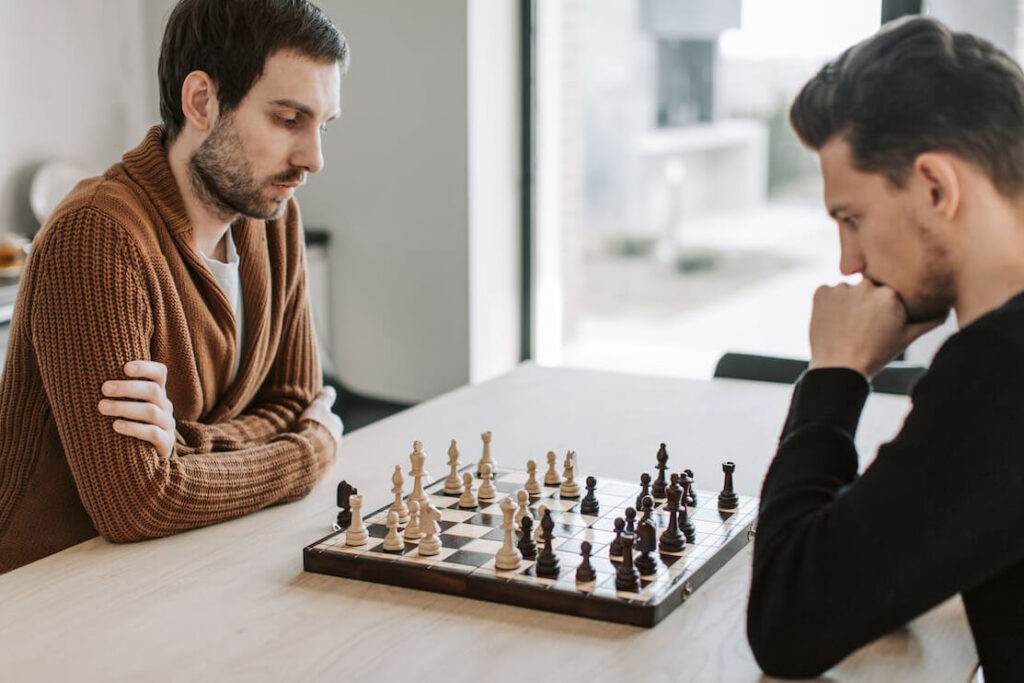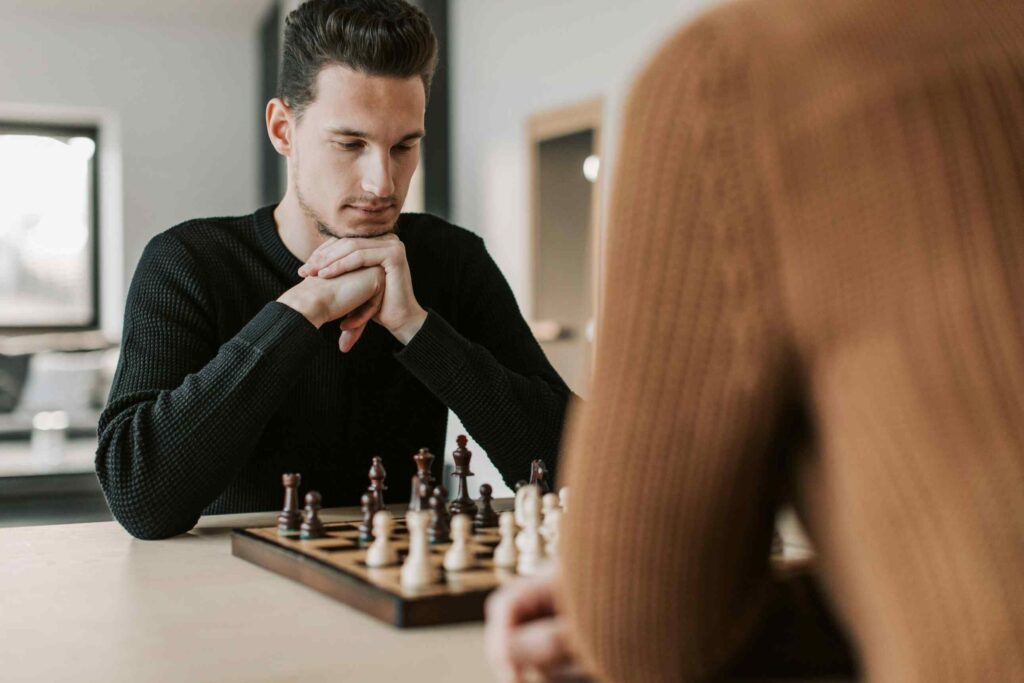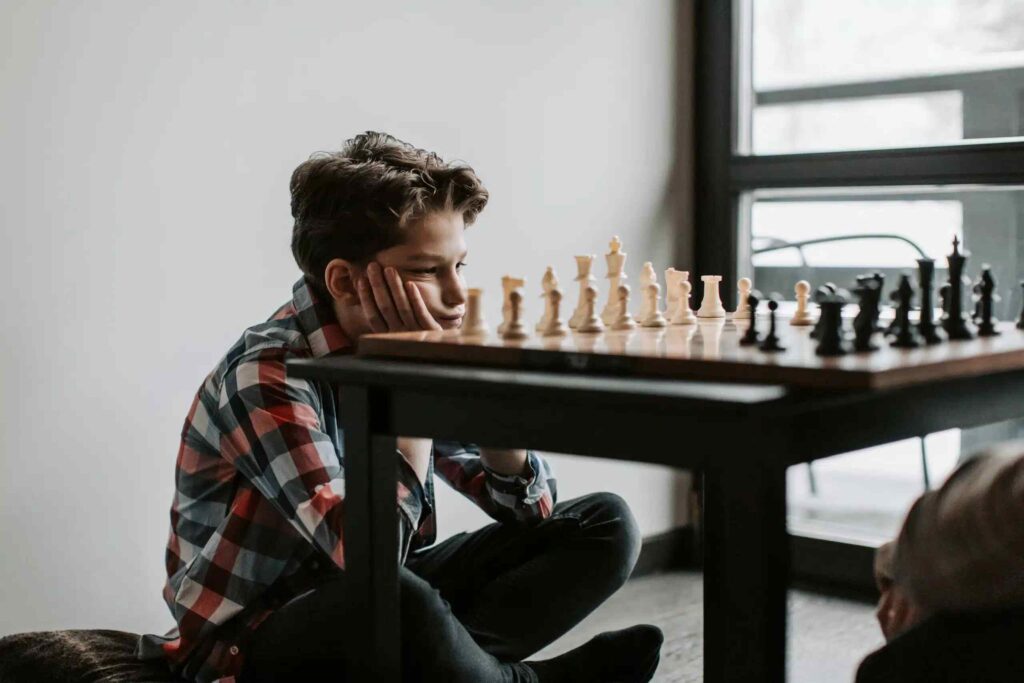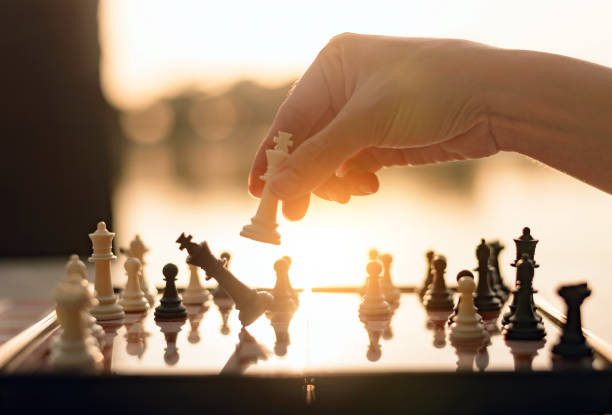Chess is often described as a battle of minds, a game where thinking ahead and strategy are everything. But beyond the tactics and the planning, there’s something deeper that chess teaches—patience. In a fast-paced world where instant results are expected, chess stands out as a game that requires you to slow down, think carefully, and, above all, be patient.
Learning to play chess well is not just about mastering openings or memorizing combinations. It’s about building the psychological endurance to sit through long games, handle unexpected setbacks, and remain calm under pressure. This psychological endurance isn’t just valuable on the chessboard—it can enhance every part of your life.
The Slow, Steady Nature of Chess
Chess is often slow and deliberate, which might seem boring to someone who isn’t familiar with the game. But this slow pace is exactly where the beauty lies.
Unlike many games where things happen quickly and decisions are made on the fly, chess requires you to carefully consider every move. This process of slowing down and thinking through each step teaches you a level of patience that’s rare in today’s fast-moving world.
Thinking Before Acting
In chess, acting too quickly usually leads to mistakes. Every move affects the entire game, so rash decisions can lead to a loss.
As a player, you learn to stop, reflect, and only then make a move. This habit of thinking before acting becomes second nature the more you play.
Over time, this mental discipline spills over into your daily life. You start to become more thoughtful in other areas, whether it’s in making important life decisions or managing your emotions.
You stop rushing into things and instead take the time to consider your options, a skill that helps build psychological endurance.
Seeing the Long Game
One of the key aspects of chess is learning to think several moves ahead. You don’t just focus on the immediate move in front of you—you plan, prepare, and anticipate your opponent’s next few moves.
This kind of long-term thinking trains your brain to be patient, as you understand that good results don’t come immediately.
In life, it’s easy to get frustrated when things don’t go our way right away. But through chess, you learn that success often requires time and effort.
The ability to stick with something, even when the results aren’t immediate, is one of the hallmarks of patience. Chess helps you practice this every time you play, making you more mentally prepared for the long game in life as well.
How Chess Teaches Patience Through Setbacks
Every chess player, no matter how skilled, will face setbacks. Whether it’s losing a key piece unexpectedly or realizing your opponent has outmaneuvered you, chess teaches you to handle these moments with grace and patience.
It’s easy to get frustrated when things don’t go your way, but in chess, learning to keep calm and think clearly under pressure is essential for success.
Embracing Mistakes as Learning Opportunities
In chess, mistakes are inevitable. Even the most experienced players make them. However, one of the greatest lessons chess teaches is that mistakes aren’t failures—they’re opportunities to learn.
When you make a bad move, instead of letting frustration take over, you’re encouraged to reflect on what went wrong and why. This reflection helps you grow as a player, teaching you not only how to avoid that mistake in the future but also how to handle setbacks with patience.
This mindset shift—seeing mistakes as chances to improve—builds psychological endurance. You start to approach challenges in life with the same calm, reflective attitude.
Instead of getting discouraged when things don’t go your way, you learn to see obstacles as opportunities to grow. This kind of resilience is a key component of patience, allowing you to stay composed and focused even in difficult situations.
Staying Composed Under Pressure
Chess is a game of pressure. You’re constantly balancing offense and defense, trying to outthink your opponent while protecting your position.
This pressure intensifies in competitive games, especially when the clock is ticking. Yet, good chess players know that giving in to frustration or anxiety only leads to poor decisions.
The practice of staying calm under pressure on the chessboard translates directly to real-life situations. Whether you’re facing a stressful deadline at work, dealing with a tough personal situation, or navigating a difficult decision, the ability to remain composed allows you to make better choices.
Patience under pressure gives you the mental clarity to think through problems and handle stress more effectively.
Chess and the Power of Waiting
A unique aspect of chess is that sometimes the best move is to wait. Not every moment requires action.
There are times in the game when your position is strong, and making a move would only weaken it. In these situations, chess teaches you the art of waiting for the right moment to act.
Recognizing When to Pause
In life, just as in chess, not every problem can be solved by immediate action. Sometimes, the best thing to do is wait, gather more information, or let the situation unfold naturally.
Chess helps develop this kind of patience by teaching you to recognize when it’s time to pause and observe. Knowing when to wait and when to act is a critical skill in both chess and life.
For example, if you rush into decisions because you feel the need to be doing something, you’re more likely to make mistakes. Chess helps you build the patience needed to be comfortable with moments of inaction, trusting that the right time to move will come.
Patience Leads to Better Decisions
One of the reasons patience is so valuable in chess is because it leads to better decisions. Rushed decisions often result in blunders, while carefully considered moves tend to be stronger and more strategic.
Chess reinforces this idea constantly, training your brain to slow down and think deeply before acting.
This habit of careful decision-making becomes useful in everyday life. Whether you’re making a career choice, deciding how to handle a personal issue, or managing a financial decision, the patience you learn from chess helps you avoid impulsive choices.
Instead, you weigh your options, consider the long-term effects, and make decisions that are more thoughtful and well-informed.
Building Patience Through Long Games

Chess is not a game of quick decisions or instant results. It can take hours to finish a single game, especially if you’re playing with an evenly matched opponent. In these long games, patience is tested and strengthened.
The ability to remain focused, calm, and engaged over an extended period of time helps develop not just patience, but also mental endurance.
Mental Endurance and Focus
Long chess games require sustained concentration. Every move matters, and losing focus, even for a moment, can lead to a critical mistake.
This need for extended focus builds your mental stamina. Just like a runner builds physical endurance through long-distance training, chess players build psychological endurance by staying mentally engaged for the entirety of a long game.
This type of endurance is incredibly valuable in everyday life. Many challenges we face—whether at work, school, or home—require long-term focus and persistence.
The patience you develop in chess, by staying focused through the length of a game, translates to other areas where long-term effort is needed, such as working on a big project, preparing for exams, or navigating complex personal challenges.
Delayed Gratification: Waiting for the Right Opportunity
One of the key lessons in chess is that good things come to those who wait. Often, the best strategies take time to develop.
You might have a long-term plan in mind, but to execute it successfully, you need to wait for the right moment to strike. Rushing into action too soon can ruin even the best-laid plans.
This teaches an important life skill—delayed gratification. In a world where we often seek instant rewards, chess encourages players to wait for better outcomes. You learn to trust the process, knowing that taking time to plan and prepare often leads to greater success in the end.
Whether you’re saving money for a long-term goal, working toward a career promotion, or simply waiting for the right time to take action on something important, chess teaches you the value of being patient and waiting for the right opportunity.
This is a critical part of psychological endurance—understanding that success often requires time, and rushing the process can lead to failure.
Handling Uncertainty with Patience
Another crucial lesson chess teaches is how to deal with uncertainty. In chess, you can’t predict every move your opponent will make.
You might have a plan, but your opponent could do something unexpected that forces you to adjust. Chess teaches you to be flexible and patient in the face of uncertainty.
Patience in the Face of the Unknown
Life, like chess, is full of unknowns. You may have a plan for your career, your personal life, or a project you’re working on, but things don’t always go as expected. Learning to adapt, stay calm, and patiently handle the unknown is essential for building psychological endurance.

Chess gives you repeated practice in managing uncertainty. When your opponent makes an unexpected move, you don’t panic. Instead, you take a moment to assess the new situation, adjust your strategy, and proceed with patience.
This skill is invaluable in real life, where things don’t always unfold as planned. Chess players learn to stay flexible, avoid overreacting, and calmly navigate through uncertain situations.
Responding, Not Reacting
One of the most important aspects of patience is the ability to respond thoughtfully rather than react impulsively. In chess, reacting impulsively to an opponent’s move often leads to mistakes.
Successful players take their time to understand the situation before responding.
In life, this lesson is just as important. When faced with unexpected events or challenges, responding with patience allows you to make better decisions.
Reacting emotionally or without thought often leads to regret or further complications. Chess helps train you to pause, reflect, and then respond with a clear mind, building not only patience but also emotional resilience.
The Role of Patience in Mastering Chess

Becoming a skilled chess player doesn’t happen overnight. The journey to mastery is long and filled with challenges.
This process itself requires incredible patience and persistence. Chess teaches you to embrace the idea that improvement is a gradual process, and progress comes from consistent effort over time.
Learning Through Repetition
In chess, there are no shortcuts. You must study positions, learn different strategies, and practice repeatedly to improve. Every move, every mistake, and every game adds to your understanding.
The patience you build comes from accepting that improvement takes time, and you have to go through many lessons and experiences before seeing significant progress.
This mindset translates into everyday life as well. Whether you’re learning a new skill, working on a long-term project, or even trying to develop a new habit, patience is key.
Chess teaches you that the journey of learning and improvement is ongoing, and every small step forward is part of a larger process.
Handling Plateaus in Progress
One of the biggest tests of patience in chess comes when you hit a plateau. There are moments where, despite your best efforts, it feels like you’re not improving.
This can be frustrating, but it’s a common part of the learning process. Players who can remain patient during these periods, staying committed and continuing to learn, eventually break through and reach new levels of skill.
In life, we often experience similar plateaus—times when we’re working hard but not seeing immediate results. Patience is what keeps us moving forward, knowing that persistence will eventually pay off.
Chess builds this kind of psychological endurance by teaching players to trust the process, even when the results aren’t immediately visible.
Chess and Emotional Patience
Chess doesn’t just build patience for strategic thinking—it also teaches emotional patience. As in life, chess is filled with moments that can trigger frustration, stress, or even excitement.
The ability to control your emotions, remain calm, and think clearly during these moments is a skill that chess helps develop.
Keeping Emotions in Check
In chess, losing your temper or getting frustrated can cloud your judgment. Emotional outbursts often lead to impulsive moves, and impulsive moves lead to mistakes.
Chess forces you to manage these emotions and stay focused on the game, even when things aren’t going your way.
This skill of emotional regulation is incredibly valuable in everyday life. Whether it’s dealing with stressful situations at work, handling personal conflicts, or managing disappointment, the ability to keep your emotions in check and approach problems with a calm mind is essential.
Chess teaches you to practice this kind of emotional patience regularly.
Building Resilience Through Losses
Every chess player, no matter how skilled, experiences loss. Losing can be frustrating, especially if it comes after hours of effort and concentration. But instead of dwelling on these losses, chess players learn to reflect, analyze, and move on.
This process helps build emotional resilience—the ability to bounce back from setbacks without losing motivation.
The patience to handle losses with grace and use them as learning opportunities is key to building psychological endurance. In life, setbacks are inevitable.
The way we handle them defines our ability to persevere. Chess teaches you that every loss is not the end, but rather a step forward in your growth, both as a player and as a person.
Chess as a Tool for Mindfulness and Patience

Beyond its tactical and emotional demands, chess also promotes a form of mindfulness. In chess, you’re fully immersed in the present moment.
You’re focused on the board, analyzing your moves, and considering your opponent’s actions. This state of deep concentration is a type of mental discipline that naturally builds patience.
Chess teaches you how to slow down and be fully present, which can lead to better decision-making and a calmer state of mind.
Staying in the Present Moment
Mindfulness is about staying present and fully engaging with what’s in front of you, and this is exactly what chess requires.
When you’re playing, your mind isn’t wandering to what happened earlier in the day or worrying about tomorrow’s tasks. You’re fully absorbed in the game, thinking only about the current position and your next move.
This state of focused attention trains your mind to handle stress and anxiety more effectively. Instead of worrying about things outside of your control, chess teaches you to focus on the task at hand.
This practice of staying present helps build patience because it keeps you grounded in the moment rather than rushing ahead or feeling overwhelmed by the future.
Developing Patience in Everyday Life
The mindfulness that chess teaches can be applied to everyday situations. Whether you’re sitting in traffic, waiting in a long line, or working through a frustrating problem, the mental discipline you build from chess helps you stay patient.
You learn that sometimes, things take time and rushing through them can lead to mistakes or unnecessary stress. Chess encourages you to stay calm, observe the situation carefully, and act when the time is right.
Patience as a Key to Success in Chess and Life
One of the reasons why chess is so effective at teaching patience is because it shows you, time and time again, that patience is essential for success. Impatience in chess leads to blunders, rushed moves, and missed opportunities.
On the other hand, those who practice patience and take the time to fully evaluate their options are the ones who succeed.
Waiting for the Perfect Opportunity
In chess, it’s often tempting to make an aggressive move, go on the attack, or push for an advantage before the time is right.
However, skilled players know that waiting for the perfect opportunity is often the best strategy. You learn to hold back, improve your position, and wait until everything is in place before launching your attack.
This lesson applies directly to life. Many times, we feel pressured to act quickly—whether it’s in making decisions at work, responding to personal challenges, or pursuing goals.
Chess teaches the importance of waiting for the right moment, knowing that rushing can undermine your chances of success. This ability to delay gratification, to hold off on immediate action in favor of long-term success, is one of the greatest forms of patience that chess instills.
Long-Term Thinking
Chess is a game of long-term strategy. Each move affects not just the current moment but the next several moves, and sometimes the entire game.
Learning to think ahead, plan carefully, and stay committed to your strategy even when faced with setbacks is a crucial part of developing patience.
In life, this translates into an ability to think beyond the immediate future. Whether you’re saving for a financial goal, working on a big project, or building relationships, the patience you develop in chess helps you stay focused on long-term success rather than seeking instant rewards.
Chess players understand that worthwhile achievements often take time, and they develop the mental endurance to stay on course, no matter how long the journey takes.

Patience and Emotional Control Go Hand in Hand
Chess is a game where emotions can run high, especially when a game isn’t going your way. The ability to stay patient when you’re frustrated, anxious, or excited is what separates strong players from the rest.
Chess teaches you to manage your emotions and remain calm, even when things don’t go according to plan. This emotional control directly ties into your ability to stay patient during tough situations.
When you develop emotional control through chess, you’re better equipped to handle other challenges in life. Whether it’s stress at work, family responsibilities, or personal struggles, staying patient and emotionally balanced can help you think clearly and act wisely.
Chess as a Lifelong Journey in Building Patience
Chess is a game that you can spend a lifetime learning. No matter how skilled you become, there is always more to explore, more strategies to master, and new challenges to face.
This endless room for improvement teaches players the value of patience, not just within a single game but across their entire chess journey.
Learning chess is much like mastering any life skill. It requires dedication, consistent practice, and most importantly, patience. As a chess player, you understand that improvement doesn’t happen overnight, and the more patient you are with yourself and your progress, the more you’ll grow.
The Connection Between Patience and Success
Chess proves that success is often the result of consistent, patient effort. Grandmasters aren’t born—they are made through years of hard work, study, and practice.
This connection between patience and success in chess mirrors the real world, where those who are willing to invest time and effort often achieve their goals.
Patience helps you stay committed to your long-term goals, even when the road is difficult. Whether you’re learning to play chess, building a career, or developing personal skills, patience gives you the resilience to keep going, knowing that success will come with time and persistence.
Wrapping it up
Chess is more than just a game of strategy—it’s a tool for developing patience and psychological endurance. Through thoughtful decision-making, handling setbacks, and managing emotions, chess teaches the value of waiting for the right moment and sticking with long-term goals. The patience you develop on the chessboard builds mental strength and resilience that you can apply to every area of life.
At Global School of Chess, we help players of all levels use chess not just to improve their game, but to strengthen their mindset.
READ NEXT:

